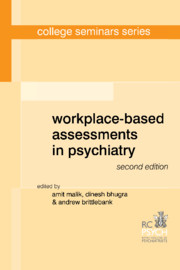Book contents
- Frontmatter
- Contents
- List of tables, boxes and figures
- List of contributors
- Preface
- 1 Introduction: changes in training
- 2 Workplace-based assessment methods: literature overview
- 3 Case-based discussion
- 4 The mini-Assessed Clinical Encounter (mini-ACE)
- 5 The Assessment of Clinical Expertise (ACE)
- 6 Multi-source feedback
- 7 Direct Observation of Non-Clinical Skills: a new tool to assess higher psychiatric trainees
- 8 Workplace-based assessments in psychotherapy
- 9 Educational supervisor's report
- 10 Portfolios
- 11 Annual Review of Competence Progression (ARCP)
- 12 Examinations in the era of competency training
- 13 Piloting workplace-based assessments in psychiatry
- 14 Developing and delivering an online assessment system: Assessments Online
- 15 A trainee perspective of workplace-based assessments
- 16 Conclusions
- Appendix 1 Assessment forms
- Appendix 2 Guide for ARCP panels in core psychiatry training
- Appendix 3 The MRCPsych examination
- Index
7 - Direct Observation of Non-Clinical Skills: a new tool to assess higher psychiatric trainees
Published online by Cambridge University Press: 01 January 2018
- Frontmatter
- Contents
- List of tables, boxes and figures
- List of contributors
- Preface
- 1 Introduction: changes in training
- 2 Workplace-based assessment methods: literature overview
- 3 Case-based discussion
- 4 The mini-Assessed Clinical Encounter (mini-ACE)
- 5 The Assessment of Clinical Expertise (ACE)
- 6 Multi-source feedback
- 7 Direct Observation of Non-Clinical Skills: a new tool to assess higher psychiatric trainees
- 8 Workplace-based assessments in psychotherapy
- 9 Educational supervisor's report
- 10 Portfolios
- 11 Annual Review of Competence Progression (ARCP)
- 12 Examinations in the era of competency training
- 13 Piloting workplace-based assessments in psychiatry
- 14 Developing and delivering an online assessment system: Assessments Online
- 15 A trainee perspective of workplace-based assessments
- 16 Conclusions
- Appendix 1 Assessment forms
- Appendix 2 Guide for ARCP panels in core psychiatry training
- Appendix 3 The MRCPsych examination
- Index
Summary
One of the conditions for the validity of a workplace-based assessment (WPBA) system is that it provides for the assessment of all parts of its curriculum (Collett et al, 2009). The WPBA systems in current use in the UK emphasise the assessment of clinical competencies with only limited coverage of other areas of competency. For example, in addition to the tools that assess clinical areas, the psychiatry WPBA system offers assessment tools for teaching (Assessment of Teaching) and presentation skills (Journal Club Presentation and Case Presentation), yet there is no tool that assesses other areas of non-clinical competency.
The importance of engaging doctors in the management and leadership of healthcare systems is now widely recognised (Dickinson, 2008) and the domains of management and leadership are therefore important areas of postgraduate medical training. In 2008, the Academy of Medical Royal Colleges (AMRC) in partnership with the NHS Institute for Innovation and Improvement published the Medical Leadership Curriculum, which sought to ensure that all postgraduate medical curricula, including those of psychiatry, included sufficient coverage of management and leadership competencies (AMRC, 2008).
Up to now, the only evidence that psychiatric trainees can offer of their competency in the areas of management and leadership comes from multisource feedback and supervisors’ reports. Although these are important sources of evidence, they do not readily provide opportunities for giving timely and specific feedback, which is recognised as the strength of WPBAs (Carr, 2006). There is therefore a need for a workplacebased assessment tool that provides short-loop feedback on a trainee's performance of tasks that involve the exercise of competencies in these areas. The Royal College of Psychiatrists has been working to develop a new assessment tool, the Direct Observation of Non-Clinical Skills (DONCS), to meet this need. The piloting of the DONCS allowed an opportunity to take the development of WPBAs further by trialling new ways of marking and a new way of mapping WPBAs to curricula requirements.
- Type
- Chapter
- Information
- Workplace-Based Assessments in Psychiatry , pp. 76 - 83Publisher: Royal College of PsychiatristsPrint publication year: 2011



